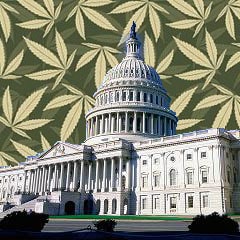 Opening a pot shop in D.C. means signing a paper that says you’re a criminal
Opening a pot shop in D.C. means signing a paper that says you’re a criminal
By Martin Austermuhle
Montgomery Blair Sibley has been waiting for this chance for a while. Not only does the longtime local lawyer have a location for his pot-cultivation center scoped out along New York Avenue NE, but he’s also been shopping himself out as something of a consultant and legal counselor for anybody else looking to get into the District’s nascent medical marijuana program.
But now he’s having second thoughts.
When the District formally opened the application process in early August for the 10 planned cultivation centers that will supply marijuana to five dispensaries, the D.C. Department of Health required that all applicants sign an “acknowledgement and attestation form.” The four-page document asks all applicants to verify that they’ve never been convicted of a felony or a drug-related misdemeanor, don’t owe the city any back taxes, and understand the lengthy rules governing the program.
It also requires that all hopefuls sign off on three provisions that would limit any liability faced by the District should the program be shut down, indemnify the city against any losses, and admit they recognize that growing, distributing, and possessing marijuana is a violation of federal law–no matter what the District’s medical marijuana program says.
The final provision engages in some legal acrobatics to distance the city from the program it’s charged with implementing: “The District of Columbia’s law authorizing the District’s medical marijuana program will not excuse any registrant from any violation of the federal laws governing marijuana or authorize any registrant to violate federal laws.”
In short, even though applicants will submit lengthy applications in hopes of gaining a license from the District to grow or dispense marijuana–a federal offense–the city claims it isn’t actually authorizing or excusing what will invariably be a violation of federal law. (The city will be taking its money, though– $5,000 for each application filed and $5,000 a year simply to operate a cultivation center. A dispensary will cost $10,000 a year.)
As tortured as it might be, the legal fine print has a purpose.
 Despite the fact that 16 states and the District have approved the use of marijuana for medicinal purposes, no amount of talk of compassion and effective pain relief changes the fundamental truth that marijuana is still a Schedule I drug. According to the feds, there’s a high chance that it’ll be abused, and it has “no currently accepted medical use in treatment in the United States.” In October 2009, though, the Department of Justice issued a memo saying that the federal government wouldn’t be using its finite resources against marijuana in states where its use for medicinal purposes was legal.
Despite the fact that 16 states and the District have approved the use of marijuana for medicinal purposes, no amount of talk of compassion and effective pain relief changes the fundamental truth that marijuana is still a Schedule I drug. According to the feds, there’s a high chance that it’ll be abused, and it has “no currently accepted medical use in treatment in the United States.” In October 2009, though, the Department of Justice issued a memo saying that the federal government wouldn’t be using its finite resources against marijuana in states where its use for medicinal purposes was legal.
That suddenly changed in June of this year, when Deputy Attorney General James Cole wrote a follow-up memo saying pretty much the opposite: “Persons who are in the business of cultivating, selling or distributing marijuana, and those who knowingly facilitate such activities, are in violation of the Controlled Substances Act, regardless of state law.”
The memo landed just as city officials were deciding how the District’s long-awaited medical marijuana program would actually work. What most irked city officials was the part of the memo saying those who “knowingly facilitate” the growing and distribution of marijuana would be as much in violation of federal law as those actually doing it: You give someone else a license to do it, and you may as well be doing it yourself.
Hence the legal waiver. Now applicants have to sign a form admitting not only that they know they’re breaking federal law, but that if they get caught, it’s all on them–and not on the D.C. government.
Colette Chichester, a special assistant to Department of Health Director Mohammad Akhter, notes that the program’s rules always included a requirement that applicants assume “any and all risk or liability” from their participation in the medical marijuana program. The waiver, she says, is simply “more beefed up” to limit any exposure the city could suffer if the feds start busting down the doors of local cultivation centers and dispensaries.
According to Allen St. Pierre of the pro-marijuana advocacy group NORML, this waiver may well be the first of its type for states with medical marijuana programs. Admitting that he was “hardly surprised” to see it, St. Pierre notes that it reflects the difficult balance faced by city officials who want to reap tax benefits from cultivation centers and dispensaries while staying on the right side of federal law.
But what it means is not only that all the danger of the operation is shifted onto the distributors, but that they may be even more vulnerable to prosecution with the waiver than without it. For Sibley, who guesses he could spend $100,000 just to get his cultivation center up and running, this isn’t just an unacceptable business risk. (“Investors are melting away like ice,” he says.) It’s also a violation of his rights. In a lawsuit filed Aug. 16, Sibley asked a federal judge to forbid the District from forcing applicants to sign the form because it would violate their Fifth Amendment rights against self-incrimination. He also argued that the waiver constitutes entrapment: The city is enticing applicants into breaking the law by granting them licenses, then denying them any semblance of a defense should they get caught.
Not everyone in the medical marijuana movement is so put off by the waiver, though. Kris Hermes, who works with Americans for Safe Access, says such language is “marginal when compared to the benefits” of actually getting a medical marijuana program off the ground, especially in a climate of renewed federal threats. St. Pierre largely agrees. “It’s a tortured process to get from point A to point B,” he said. “But we want to get to point B.”
In the minds of many anxious to see medical marijuana get to patients in the District, a tightly regulated program is better than no program at all. And the District may be doing a better job of balancing local prerogatives against federal concerns than any other jurisdiction in the country. Local cultivation centers will each be limited to 95 plants, just shy of the 100 plants that usually provoke a five-year mandatory federal sentence. Moreover, the recent Department of Justice memo seems to focus on “large-scale, privately-operated industrial marijuana cultivation centers”–much more a California phenomenon than what D.C. has in mind.
Still, the risks are too high for one group. The D.C. Patients’ Cooperative, a nonprofit run by Adam Eidinger, who owns Capitol Hemp in Adams Morgan and Chinatown, decided to jump out of the game, despite having been actively involved in writing the rules that will eventually govern it. He says the organization decided it wants nothing to do with a program “that treats us like criminals.”
Eidinger is also frustrated that the District opted not to allow home cultivation–14 states with medical marijuana programs do–a step that could have likely saved the District from the threat of federal intervention. The June DOJ memo focused on “commercial” operations, giving advocates renewed assurances that small-time home-growers with qualifying medical conditions will remain safe.
In late August, Sibley met with nine other groups that are planning to submit applications for cultivation centers, which are due Sept. 16. (The application process for dispensaries will open that same day.) Many shared his concerns, and some even said they’d be willing to join his lawsuit. Regardless, all agreed that they’d move forward and submit their applications, which will be judged by a five-person committee.
As for Sibley, he remains torn. “It’s a difficult choice,” he says, not wanting to swear off the one chance he might have to apply for a cultivation-center license. But if things don’t change, he may pull the plug: “I wouldn’t sign the form as is,” he says.
Article From The Washington City Paper







